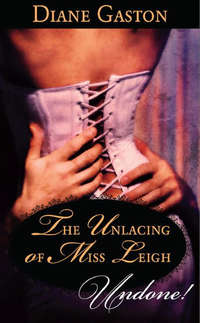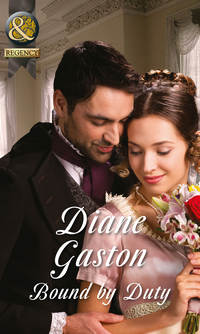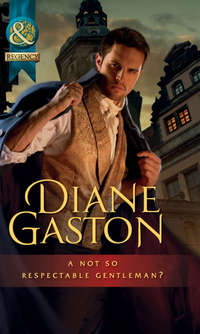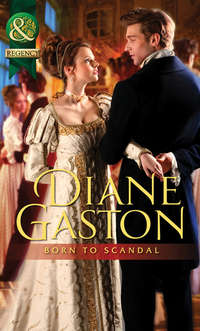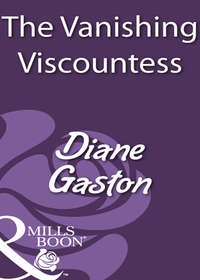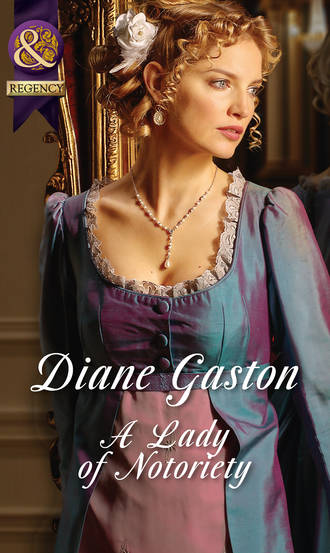
Полная версия
A Lady of Notoriety
Had not the abbess said she must break herself of telling falsehoods as a means of avoiding unpleasantness? Even if the lies were little ones.
She would do so, she vowed.
Next time.
She swallowed more guilt. ‘Try to remember to call me Mrs Asher and don’t call me m’lady, if you can help it.’
The three servants nodded agreeably.
Was she wrong to make them go along with her lie? Of course she was.
‘It will be as you wish it, m’lady,’ Carter said. ‘I mean, ma’am.’
‘Let us go, then.’ She allowed Carter to assist her into the carriage. Monette climbed in after her and Carter sat with John Coachman.
They drove the short distance to a white stucco cottage with well-tended shrubbery and a small stable for the horses.
Carter opened the carriage door and put down the step. Daphne and Monette climbed out as the housekeeper and caretaker walked out to greet them.
‘We are Mr and Mrs Pitts, ma’am,’ the caretaker said. ‘At your service.’
‘I am Mrs Asher,’ Daphne shook their hands, feeling only a twinge of guilt. She introduced the others. ‘We have an injured man with us. Mr Westleigh. He will need to be taken to a bedchamber as quickly as possible.’
The housekeeper gestured to the door. ‘Come in, then, Mrs Asher, and tell us which room shall be the gentleman’s.’
Leaving Monette to watch over Westleigh, and Carter and Mr Pitts to unload the trunks, Daphne followed the housekeeper inside. The decor was modest, but luxurious if she compared it to Fahr Abbey. They should do very nicely there. It would only be for a day or two, until Westleigh’s family could come.
‘Let us look at the bedchambers.’ Mrs Pitts started up the stairs. ‘You may pick which one should go to the gentleman.’
Carter and Mr Pitts entered.
‘We have Mr Westleigh’s trunk,’ Carter said.
‘Follow us.’ Daphne walked up the stairs.
She chose the nicest of the bedchambers for Westleigh. It was a corner room with windows on both sides to let in lots of light and fresh air.
‘Does the bed have fresh linens?’ she asked.
‘Indeed,’ responded Mrs Pitts. ‘We readied the rooms when the agent sent a message that you were to arrive right away.’
That was what a good housekeeper should do, Daphne thought. She’d learned, though, that even servants liked to be thanked.
‘How very good of you.’ She smiled at Mrs Pitts and turned towards Carter. ‘Bring him here.’
He and Mr Pitts set down the trunk and left the room.
‘Do you wish to see the rest of the house now?’ Mrs Pitts asked Daphne.
‘I will see the gentleman settled first,’ she replied.
‘Let me see to the meal, then, ma’am.’
Mrs Pitts left and a few moments later, the men helped Westleigh to the bed.
‘Where am I?’ Westleigh asked, tense and confused. ‘Where have you taken me?’
Daphne came to his side and touched his hand. ‘You are in a cottage on the road to Maidstone.’ She used her most soothing voice.
‘Not going to Maidstone. Going to London.’ He tried to stand.
Daphne put a hand on his shoulder and he sat again. ‘You are too ill to travel to London.’ She had been making explanations like this for the past two hours—every time he woke and did not know where he was. ‘You were in a fire and you injured your eyes and your head. You need to rest in this bed here and we will care for you until you are better. Then you will go to London.’
‘Rest?’ He relaxed. ‘Then London.’
Carter spoke. ‘You should leave the room, m’l—Mrs Asher, while I undress him.’
She turned to the housekeeper’s husband. ‘Would you bring him water? Soap and towels, too, if possible, so Carter can bathe him a little? I am certain he will be more comfortable when clean again. Be gentle with his face, though.’
‘Water, soap and towels are already here, ma’am.’ The man pointed to a chest of drawers upon which sat a pitcher and basin and folded towels. He left the room.
Carter spoke. ‘I’ll clean him up, ma’am. Leave him to me.’
Daphne moved her hand, planning to step away, but Westleigh groped for it and seized it, pulling her back. ‘Do not leave,’ he rasped. ‘Do not leave me alone.’
His firm grip and his intensity shook her. She did not know how to calm him.
She stroked his hair—what little hair was not covered by bandages. ‘Shh, now,’ she said, trying to sound like the abbess who’d soothed her when she’d become overwrought. ‘You are not alone. Carter is here.’
‘I am here, sir,’ Carter said.
Daphne continued. ‘Now remain still and Carter will take off your boots. Will that not feel more comfortable?’
‘I’ll give you a little wash and put you in clean bedclothes,’ Carter added.
Daphne felt Westleigh’s muscles relax.
‘Do not wear bedclothes,’ he murmured.
Chapter Two
The dragon pursued him, its fiery breath scorching his skin. Stinging his eyes.
Hugh pushed himself to run faster, to escape.
The way out was ahead, a pinpoint of light that seemed to become more distant the harder he pumped his legs to reach it. The flames roared, as if the dragon laughed at him. The blaze encircled him, bound him. Devoured him.
He jolted awake.
To darkness.
He sat up and his hands groped for his eyes. ‘I can’t see! Why can’t I see?’ His eyes were covered in cloth.
Then he remembered. The fire had not been a dream. It had burned his eyes, all brightness and pain. Was he blind?
‘The bandages. Take them off!’ He pulled at them.
There was a rustle of fabric and the scent of roses filled his nostrils. Cool hands clasped his.
‘Your eyes are injured.’ The voice was feminine and soothing, but not familiar. ‘The bandages need to stay on for you to heal.’
‘Who are you?’ He swallowed. His throat hurt when he spoke.
‘I—I am Mrs Asher. You carried me out of the fire—’
He remembered only one woman he’d carried out of the fire, down the flame-filled stairway, all the way to the cool night outside.
‘Where am I?’ he rasped.
‘You—you are in my cottage in—in Thurnfield.’
Thurnfield?
The village on the road to London? He’d passed through it many times.
She went on. ‘You cannot travel, so we brought you here.’
That made no sense. ‘I was in Ramsgate. If I cannot travel, how is it I came to Thurnfield?’
Her voice turned cautious. ‘We could not find a place for you in Ramsgate. Not one where you could receive care.’
She was caring for him? Who was this woman? He wanted to see her. Look her in the eye. Figure out the reason for the uneasiness in her voice.
But that was impossible.
He cleared his throat. ‘You said we.’
‘My maid and footman and me.’
She had a maid and a footman. A woman of some means, then. Of wealth? Were there more servants, perhaps? ‘A maid and footman. Who else is here?’
‘A housekeeper and her husband.’ She paused. ‘That is all.’
Modest means, then, but she was holding back something, he would bet on it. ‘Where is Mr Asher?’
‘I am a widow.’ Her voice turned low, and that provoked a whole new set of emotions.
He suddenly recalled that the woman he’d carried had weighed hardly more than a whisper. She’d curled trustingly against his chest, hiding her face from the fire.
He cursed the bandages covering his eyes. He wanted to see her. Face her like a man.
‘My name is Westleigh.’ He extended his hand, which seemed to float in empty space.
She grasped it.
Her hand felt soft, like the hand of a gently bred woman.
‘I know who you are,’ she said, her voice turning tight again. ‘We learned at the inn that you are Mr Hugh Westleigh. We have your trunk. Like ours, it was with the carriages and spared from the fire.’
Had she also learned he was the younger brother of the Earl of Westleigh? Was this a factor in bringing him here?
If only he could look into her eyes—he could read her character.
If only he could see.
He pressed the bandages covering his eyes. The pain grew sharper.
A soft, cool hand drew his fingers away as it had done before. ‘Please do not disturb your bandages. The surgeon said your eyes are to remain bandaged for two weeks. That is how long they will take to heal.’
‘Will they heal, then?’ he demanded. ‘Or am I to be blind?’
She did not answer right away. ‘The surgeon said they must stay bandaged or they will not heal. That much is certain. He said they could heal, though.’
Hugh laughed drily. ‘Could heal. That is not very reassuring.’
Her voice turned low again. ‘I am only repeating what he told me.’
He caught himself. She obviously had taken on the task of caring for him. He need not be churlish in return.
He lifted his throbbing head again and turned in the direction of her voice. ‘Forgive me. I do not customarily succumb to self-pity.’
‘Of course you do not.’ Now she sounded like his old governess. ‘Are you thirsty?’
Good of her to change the subject.
He was thirsty, by God. Parched.
He nodded.
He heard a swirl of her skirts again and the sound of pouring liquid. She lifted his hand and placed a glass in it. He took a sip.
It was water, flavoured with a touch of mint. Who took such trouble for a stranger?
He gulped it down. ‘Is there more?’
He held out the empty glass, again into nothingness. He waited for her to grasp it.
She took it and poured more, then again put it in his hand.
He drank and handed the glass back to her. ‘I detest feeling so helpless.’
‘Certainly you do,’ the governess responded. ‘But you must rest. You not only burned your eyes, you also suffered a blow to the head. The surgeon said you need rest to recover.’
He lay back against some pillows. The mere exertion of waking in strange surroundings and drinking two glasses of water had fatigued him. How annoying. How weak. He hated weakness.
‘Shall I bring you breakfast?’ she asked. ‘Or would you like to sleep some more?’
His stomach clenched at the mention of food.
He forced his raspy voice to remain calm. ‘Breakfast, if you would be so good.’
Again her skirts rustled. ‘I will be right back.’
Without his eyes, he must depend on this woman for food, for everything. How much more helpless could he be?
Her footsteps receded and a door opened. When he heard it close again, it was as if the room turned cold and menacing.
He’d never been afraid of darkness as a child. He’d never been afraid of anything, but this was a living nightmare. Had he traded the fiery dragon of his dream for darkness?
Blindness?
Carefully he felt his bandages. They were thick over his eyes and wound firmly around his head. He tried to open his eyelids, but they hardly moved, the bandages were so snug. The effort shot daggers through his eyeballs and he dared not try again lest he injure them even more.
Was his fate to be blind and helpless?
He pounded a fist on the mattress, but wished he could put his hands on something he could smash into a thousand pieces.
He didn’t fear darkness. He didn’t fear danger, but the idea of being helpless was too abhorrent for words. And he was, indeed, helpless. Helpless and confined.
He patted his arms and legs and torso—someone had put him in a shirt and drawers, he realised. He lifted the fabric of the shirt to his nose. Clean clothes. Not a hint of smoke. Someone had bathed and clothed him.
Had she undressed him and clad him in a clean shirt? In drawers?
He strained to remember. He recalled leading people out of the fire. Of fire blasting his face. He vaguely remembered being jostled in a carriage, but those memories were mere flashes, with no coherence at all.
His head throbbed and he pressed his temples. How injured was he? He stretched his arms, flexed his legs. The rest of him seemed in one piece. He felt the sting of burns here and there on his skin, but nothing of significance.
He could still walk, could he not? If so, he’d be damned if he remained bedridden.
He slipped off the bed. His legs held him, so he felt his way around the bed’s edge before stepping away. He hated not knowing what lay in his path. Waving his hands in front of him, he took tentative steps. Was this life without sight? Caught in emptiness? Unsure of every step?
A door opened.
‘Mr Westleigh!’ It was Mrs Asher’s voice. ‘You should not be out of bed!’
He heard the clatter of dishes—and smelled porridge. He felt her come near. Caught the scent of roses.
She took his arm. ‘Let me help you back to bed.’
He pulled away. ‘I will not be an invalid.’
She tugged at him. ‘No, but you must rest or you risk being that very thing.’
He still did not wish to comply. ‘Did you bring food?’
‘Yes,’ she replied. ‘And a tray. See? You will be able to eat nicely in bed.’
He jerked away. ‘I cannot see.’
She stepped back and left him in the emptiness again.
Let her abandon him! He’d find his own way back, if necessary.
He turned to where he thought she stood. ‘Is there a table and chair in this room?’
She did not answer right away. ‘Yes.’
‘Then I will sit and eat like a man.’
‘Very well.’ She sighed. ‘Stay where you are.’ He heard furniture being moved. She took his arm again. ‘Come here.’
She led him to a chair. He sat and heard the table being moved towards him. A moment later he smelled the food and heard the sound of a tray being placed in front of him.
She took his hand and placed a spoon in it, and showed him the bowl. ‘It is porridge. And tea.’
He was suddenly famished, but he paused, trying again to face her, wherever she might be. ‘Mrs Asher?’
‘Yes?’ Her voice was petulant, as it should be after his abominable behaviour.
‘Do forgive me.’ He’d behaved badly towards her again. ‘I should be thanking you, nothing else.’
It took several seconds for her to speak. ‘Your apology is accepted, Mr Westleigh.’ Her voice softened. ‘But do eat. You need to eat to gain strength.’
‘I am grateful for the food. I am quite hungry.’ He dipped the spoon, but missed the bowl. ‘Blast.’ He’d forgotten where the bowl was located.
She directed him on his next try. This time he scooped up a spoonful of porridge and lifted it. He missed and hit the corner of his mouth.
She wiped it with a napkin. ‘Let me help you.’ Putting her hand on his, she guided the spoon to his mouth.
The first taste made him ravenous, but he could not bear being fed like a helpless infant. ‘I think I can manage it.’ He groped for the bowl and picked it up in one hand and held it close to his mouth. With his other hand he scooped the porridge with the spoon and shovelled it into his mouth.
No doubt his manners were appalling.
He scraped the bowl clean and felt for a space on the table to put it down. With his fingers, he carefully explored what else was there.
A tea cup, warm to the touch. How was he to manage lifting a tea cup without spilling it?
‘How do you take your tea?’ she asked. ‘I will fix it for you.’
‘Milk and one lump of sugar.’ He listened to the clink of the spoon as she stirred.
When the clinking stopped, she again guided his hand to the cup. He grasped it in both hands and carefully brought it to his mouth, aware of the aroma before attempting to take a sip. He sipped slowly, not because he savoured the taste, but because he did not wish to spill it.
When he finished, he managed to place the cup into its saucer. ‘Thank you, Mrs Asher. You have been very kind.’
‘You should rest now,’ she responded. ‘The surgeon said—’
‘I will give you no further argument.’ He felt for the napkin and wiped his mouth.
She came close again and touched his arm.
‘I want to try to manage by myself.’ He pushed the chair back and stood, getting reoriented to where the bed was. He groped his way back to it and climbed under the covers, aware that she must be watching his every awkward move. In his underclothes.
‘Shall I write to your family and tell them where you are and what has happened to you?’ she asked.
His family? Good God, no.
After this trip he intended to throw off the shackles of family responsibility for a time. He’d been at the family’s beck and call ever since leaving the army.
‘Do not write to my family.’ He raised his voice. ‘They must know nothing about this.’
She did not speak.
He shook his head, realising how he must have sounded. ‘I apologise again.’ He spoke in a milder tone. ‘My family would be the very worst of caretakers.’ They were not expecting him, so they would not worry. He’d not written that he’d left Brussels. Better to not give them any time to find a new task he might perform for them. ‘I beg you would find another solution. I realise I am imposing, but I can well pay for my care. I must not be put in the hands of my family. On that I must insist.’
‘Very well. I will not contact your family.’ He heard the sounds of her picking up the tray from the table. ‘But you must rest now. Someone will check on you later.’ He heard her footsteps walking towards the door. It opened and she spoke once more. ‘Mr Westleigh?’
‘Yes?’ He stiffened, expecting a rebuke.
‘You are not imposing.’
The door closed.
He was alone again. In the dark.
Mrs Asher’s presence was a comfort, an anchor. Alone it was as if he floated in a void. He listened and thought he heard a bird singing outside, a dog’s bark at some distance, footsteps outside the room.
He stilled, waiting to hear if the door would open.
The footsteps faded.
His head ached, his throat ached, his eyes ached, but he was determined to remain awake. If he remained awake, he was not totally helpless.
To keep awake, he recalled the details of the fire.
He’d been leaving the inn’s tavern, returning to his room, when shouts of ‘fire!’ reached his ears. He’d jumped into action, knocking on doors, getting people out. The fire had started in a room on the ground floor. He and others had cleared that floor and worked their way up to the higher floors while the fire kept growing and the task grew more dangerous.
The excitement of it had spurred him on. People had needed saving and someone had to brave the threat to save them, a perfect role for Hugh. He always did what needed to be done. If there was risk involved, so much the better.
He’d fought in the war because England needed him and, if truth be told, he’d loved the adventure of it, the risk to one’s life, the chance to test his mettle. The army in peacetime was not for him, though. He’d sold his commission and prepared to discover his next adventure. He’d travel, he thought. To Africa. Or the Colonies. Or Chile—no, not Chile. With his luck he’d get embroiled in their War of Independence. It was one thing to risk one’s life for one’s own country, quite another to act as a mercenary. Besides, it was his own independence he yearned to indulge.
Instead, a family crisis had snared him. First his father had nearly impoverished the family by gambling and philandering away its fortunes, then he had tried to cheat the man who’d come to their rescue, his own natural son, John Rhysdale.
After that, Hugh, his brother Ned and Rhysdale had forced their father to move to Brussels and turn over the finances and all his affairs to Ned. Hugh was charged with making certain their father held to the bargain, which meant repeated trips to the Continent. At least this last trip had been the final one. Hugh had been summoned back to Brussels because his father had dropped dead after a night of carousing and drinking.
Hugh suffered no grief over his father’s death—the man hadn’t cared a whit about him or any of the family. His father’s death freed him at last.
Now Hugh’s independence was again threatened when nearly in his grasp. Only this time it might not be family obligation holding him back.
This time it might be blindness.
* * *
Daphne strode immediately from Westleigh’s bedchamber through the cottage and out into the garden where beds of red tulips and yellow narcissus ought to have given her cheer.
How could she be calm? She’d counted on Westleigh’s family coming to care for him. Who would not want family to nurse them back to health? She’d planned on leaving as soon as a family member arrived. They would never see the elusive Mrs Asher. A mere note would be all they knew of her.
The Westleighs would detest knowing the despised Lady Faville had cared for a family member. Hugh Westleigh would detest it, as well. She’d once tried to steal away Phillipa Westleigh’s new husband after all.
And, because her vanity had been injured, she’d heaved a lighted oil lamp against the Masquerade Club’s wall. It had shattered, just as her illusions had shattered in that moment. In a flash, though, the curtains and her own skirts had caught fire.
Her hands flew to her burning cheeks. She’d been so afraid. And ashamed! What sort of person does such a thing?
Yes, the Westleighs would hate her, indeed.
She’d been a coward that day, running away after Phillipa had saved her from her burning skirts. She was a coward still. She should simply tell Hugh Westleigh her identity—she should have told him from the beginning—
What would the abbess have said? Do what is right, my child. You shall never err if you follow the guide of your own conscience. Do always what is right.
But what happens if one does not know what is right? What is one supposed to do in that event?
Was it right to tell him the truth or better to hide the truth and not upset him?
Daphne paced back and forth. It would only be two weeks until his bandages came off and he’d be on his way. She stopped and placed her hands on her cheeks.
Unless he was blind.
Please, dear God. Let him not be blind!
She shook her head. Who was she to pray?
She, Carter and Monette simply must take the best care of him. Not upset him. Give him the best chance to heal.
Perhaps the dear abbess would intercede with God for him on Daphne’s behalf. And perhaps the abbess would forgive her if she did not tell the truth this time. No real harm in him thinking she was merely Mrs Asher for such a little while. Feeling only slightly guilty, Daphne strolled around to the front of the cottage.
Two young women approached from the road and quickened their pace when they saw her.
‘Beg pardon, ma’am. Are you Mrs Asher?’ They looked no more than fifteen years, each of them.
‘I am Mrs Asher,’ she responded.
‘We’ve come looking for work, ma’am,’ one said. ‘Mr Brill, the agent, told us you might be needing some help in the cottage—’
‘We can do whatever you need,’ the other broke in. ‘We’re strong girls. Mr Brill will vouch for us.’
Both were simply dressed and their clothing looked very old and worn. In fact, their gowns hung on them.
‘We need work very bad, ma’am,’ the first girl said. ‘We’ll do anything.’
‘I am not sure...’ Daphne bit her lip. Would it be right to hire maids to work in a house where she would stay for only two weeks?
‘Please, Mrs Asher,’ the second girl said. ‘We can show you how good we work. Give us a chance.’
What difference did it make to her? She had plenty of money to pay them. It was the easiest thing in the world to say yes. Besides, the abbess would say she’d done a good thing.
‘Very well, girls,’ she said. ‘Follow me. If Mrs Pitts approves, you may become our new maids of all work.’
They could deliver the meals to Mr Westleigh. Daphne would be able to avoid him altogether. Then it would not matter who he thought she was.
Chapter Three
Hugh lost his battle to stay awake. He had no idea how long he slept, but he woke again to darkness.




